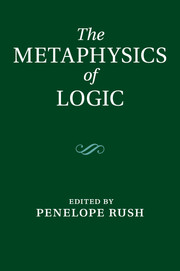Book contents
- The Metaphysics of Logic
- The Metaphysics of Logic
- Copyright page
- Dedication
- Contents
- Contributors
- Introduction
- Part I The Main Positions
- Part II History and Authors
- Chapter 8 Logic and its objects: a medieval Aristotelian view
- Chapter 9 The problem of universals and the subject matter of logic
- Chapter 10 Logics and worlds
- Chapter 11 Bolzano’s logical realism
- Part III Specific Issues
- References
- Index
Chapter 11 - Bolzano’s logical realism
from Part II - History and Authors
Published online by Cambridge University Press: 05 October 2014
- The Metaphysics of Logic
- The Metaphysics of Logic
- Copyright page
- Dedication
- Contents
- Contributors
- Introduction
- Part I The Main Positions
- Part II History and Authors
- Chapter 8 Logic and its objects: a medieval Aristotelian view
- Chapter 9 The problem of universals and the subject matter of logic
- Chapter 10 Logics and worlds
- Chapter 11 Bolzano’s logical realism
- Part III Specific Issues
- References
- Index
Summary
- Type
- Chapter
- Information
- The Metaphysics of Logic , pp. 189 - 208Publisher: Cambridge University PressPrint publication year: 2014
- 4
- Cited by

